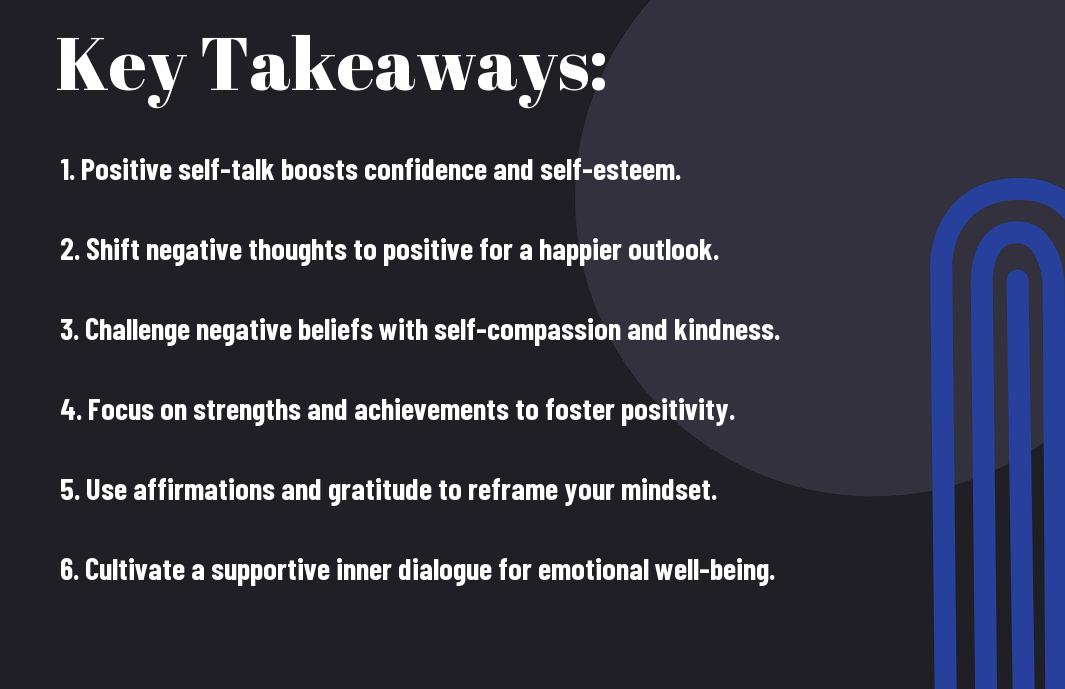Positive self-talk is not just a self-help cliché; it is a powerful tool that can significantly impact our mental well-being and overall happiness. The way we speak to ourselves internally can greatly influence how we perceive the world around us and ultimately shape our reality. By mastering the art of positive self-talk, we can transform our mindset, improve our self-esteem, and cultivate a more optimistic outlook on life. In this blog post, we will explore the benefits of positive self-talk and provide practical tips on how to shift your perspective to harness the power of positivity for a happier, more fulfilling life.
This post contains Amazon affiliate links, meaning I may earn a small commission if you purchase through my links, at no extra cost to you. Note: We aim to provide accurate product links, but some may occasionally expire or become unavailable. If this happens, please search directly on Amazon for the product or a suitable alternative.
Key Takeaways:
- Self-awareness is key: Recognizing negative self-talk patterns is the first step towards positive change.
- Challenge your negative thoughts: Question and reframe negative beliefs to shift your perspective towards positivity.
- Practice mindfulness: Stay present and focus on the current moment to avoid dwelling on past mistakes or worrying about the future.
- Affirmations can be powerful: Use positive affirmations to counteract negative self-talk and boost self-confidence.
- Surround yourself with positivity: Engage with supportive and encouraging individuals who uplift your spirit and reinforce positive self-talk.

The Psychology Behind Self-Talk
Even as we navigate through the ebbs and flows of daily life, our inner dialogue plays a crucial role in shaping our reality. How we talk to ourselves can greatly influence our emotions, behaviors, and overall well-being. To gain a deeper understanding of this phenomenon, consider delving into the world of self-talk with resources like Rewire Your Reality: Master the Art of Positive Self-Talk!
Cognitive Behavioral Insights
With Cognitive Behavioral Therapy (CBT), psychologists highlight the connection between our thoughts, feelings, and actions. This approach emphasizes identifying negative thought patterns and replacing them with more constructive ones. By challenging irrational beliefs and practicing self-compassion, individuals can reframe their self-talk to foster a healthier mindset.
Moreover, CBT teaches individuals to recognize cognitive distortions, such as all-or-nothing thinking, overgeneralization, and catastrophizing. By addressing these distortions, one can gradually transform their self-talk from self-critical to self-empowering, leading to improved mental well-being and resilience.
The Power of Thought Patterns
With the power of thought patterns, individuals can shift their perspectives and approach challenges with a positive mindset. By cultivating a habit of gratitude and focusing on strengths rather than shortcomings, one can nurture a sense of optimism and self-efficacy. This shift in mindset not only enhances overall happiness but also equips individuals to navigate life’s hurdles with grace and resilience.
Plus, by understanding the power of neuroplasticity, individuals can rewire their brain’s neural pathways through consistent positive self-talk. This process strengthens new connections associated with constructive thoughts and emotions, ultimately reinforcing a more positive self-image and outlook on life.
Mastering Positive Self-Talk
Now is the time to investigate deeper into mastering the art of positive self-talk. By understanding how to identify negative narratives and employing effective techniques for positive transformation, you can shift your perspective towards greater happiness and fulfillment.
Identifying Negative Narratives
With the first step towards mastering positive self-talk, you must learn to identify the negative narratives that have been playing in your mind. These are the internal dialogues that undermine your confidence, fuel self-doubt, and hold you back from reaching your full potential. It’s essential to recognize these patterns and acknowledge their impact on your wellbeing.
Techniques for Positive Transformation
Identifying the negative narratives is only the beginning. To truly master positive self-talk, you need to arm yourself with effective techniques for transformation. By implementing tools such as cognitive restructuring, affirmations, visualization, and mindfulness, you can reprogram your mind towards a more positive and empowering outlook.
Plus, by consistently practicing these techniques, you can rewire your brain to default to positive self-talk, enhancing your overall mental health and wellbeing.
Implementing Positive Self-Talk in Daily Life
To truly harness the power of positive self-talk, you must integrate it into your daily life as a consistent practice. By making positivity a habit, you can transform your mindset and outlook on life.
Daily Practices and Rituals
Daily affirmations are a powerful tool to start your day on a positive note. Begin each morning by affirming your worth, capabilities, and potential. This sets the tone for the day ahead and reinforces positive beliefs about yourself. Additionally, practicing gratitude daily can help shift your focus to the good in your life, fostering a more optimistic mindset.
Another daily practice to implement is mindfulness. Take time each day to quiet your mind, focus on the present moment, and observe your thoughts without judgment. This practice can help you become more aware of negative self-talk patterns and replace them with positive affirmations.
Overcoming Challenges and Setbacks
One of the key aspects of implementing positive self-talk is learning how to overcome challenges and setbacks with a positive mindset. When faced with difficulties, instead of criticizing yourself or giving in to negative self-talk, reframe the situation with a focus on growth and learning. View setbacks as opportunities for self-improvement rather than failures.
One effective strategy for overcoming challenges is to practice self-compassion. Treat yourself with the same kindness and understanding that you would offer to a friend facing a similar situation. By showing yourself positive self-talk and compassion, you can build resilience and face challenges with a positive outlook.
Implementing positive self-talk in your daily life requires consistency and dedication. It’s important to be mindful of your inner dialogue and actively challenge any negative thoughts that arise. By practicing positive self-talk daily and approaching challenges with a positive mindset, you can cultivate a sense of empowerment and happiness in your life.
Measuring Change and Maintaining a Positive Outlook
Tracking Your Progress
Change is inevitable, but it can be challenging to recognize small victories along the way. Tracking your progress is essential in maintaining a positive outlook and staying motivated on your journey towards happiness. Whether you use a journal, a gratitude jar, or a mobile app, documenting your achievements, no matter how small, can help you see how far you’ve come.
Set specific goals for yourself and track your daily or weekly progress towards them. Celebrate your wins, no matter how minor they may seem. Reflecting on your accomplishments can boost your self-esteem and reinforce positive self-talk as you witness your own growth.
Cultivating Long-Term Happiness Through Self-Talk
Through consistent and positive self-talk, you can cultivate long-term happiness by rewiring your brain to focus on the good in every situation. Practice replacing negative thoughts with affirmations and optimistic outlooks. Over time, this will become second nature, leading to a more positive and resilient mindset.
Cultivating long-term happiness through self-talk involves creating a sustainable inner dialogue that supports your well-being and fosters a sense of fulfillment. By consciously choosing to speak kindly to yourself and redirecting negative self-talk, you can nurture a more positive mindset that will serve you well in all areas of your life.
Final Words
Presently, we have explored the powerful impact of positive self-talk in cultivating happiness and shifting our perspective. By changing the way we speak to ourselves, we can create a more optimistic and empowering mindset that can lead to a more fulfilling life. It is crucial to be mindful of our self-talk and consciously replace negative thoughts with positive affirmations. With practice and dedication, we can transform our inner dialogue and ultimately improve our overall well-being. Keep in mind, you have the power to shape your own reality through the art of positive self-talk.
FAQ
Q: What is positive self-talk?
A: Positive self-talk is the practice of intentionally using uplifting and constructive language to improve your mindset and boost self-esteem.
Q: How can positive self-talk impact my happiness?
A: Positive self-talk can reframe negative thoughts, reduce stress, increase self-confidence, and cultivate a more optimistic outlook on life, leading to greater happiness.
Q: What are some examples of positive self-talk phrases?
A: Examples of positive self-talk include “I am capable of overcoming challenges,” “I deserve to be happy and successful,” and “I believe in myself and my abilities.”
Q: How can I incorporate positive self-talk into my daily routine?
A: You can incorporate positive self-talk by practicing self-affirmations, challenging negative thoughts, surrounding yourself with supportive people, and engaging in activities that bring you joy and fulfillment.
Q: Can positive self-talk improve my overall well-being?
A: Yes, positive self-talk can improve your overall well-being by reducing anxiety and depression, enhancing resilience, strengthening relationships, and fostering a more positive mindset.









